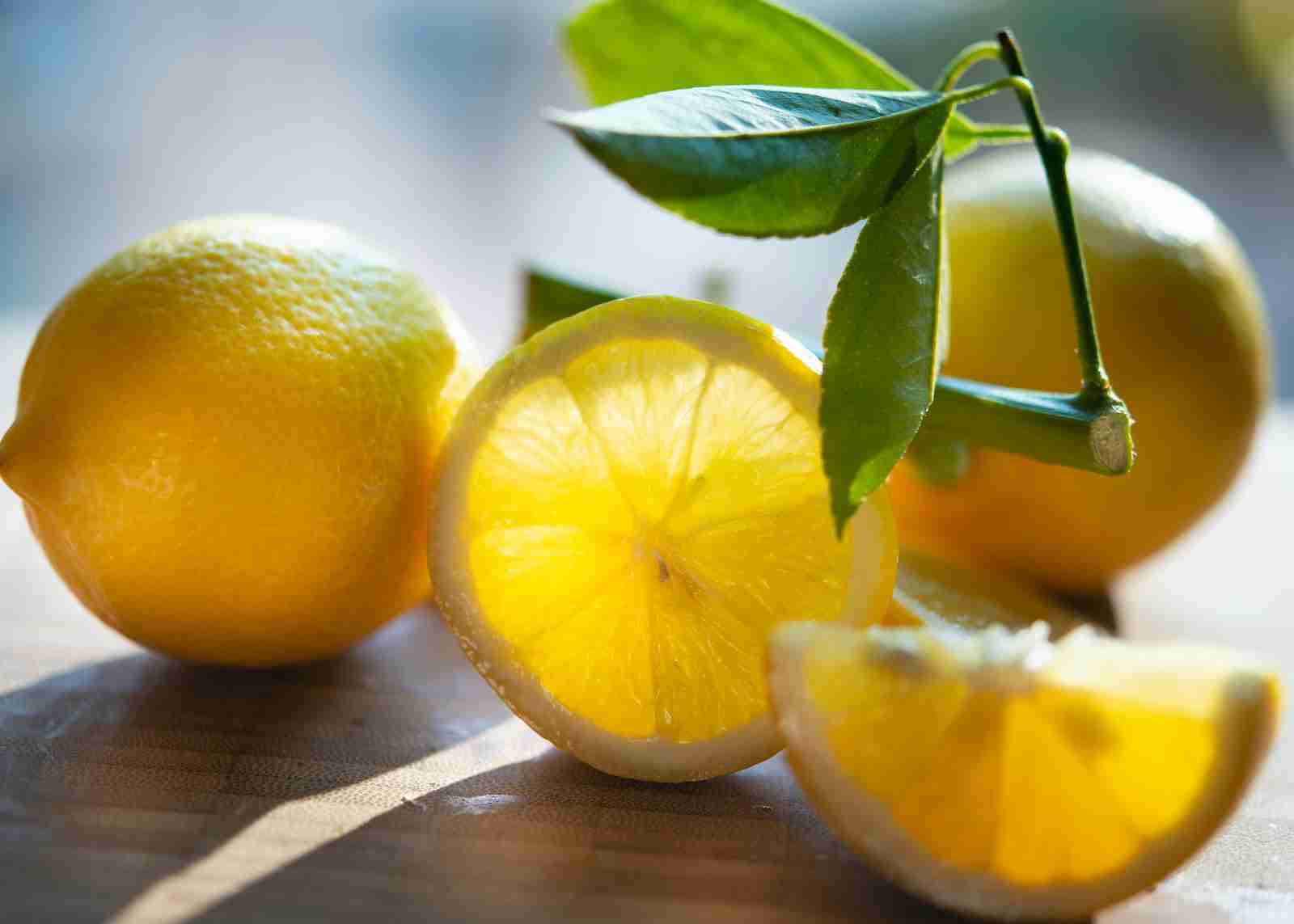26 Fun Facts About Lemons: Get a Vitamin C Kick
1. Lemons are a type of citrus fruit and belong to the Rutaceae family.
The Rutaceae family also includes oranges, limes, and grapefruits.
This family of fruits is known for their characteristic tart and acidic taste, and they are commonly used in cooking, baking, and as a source of juice.
2. Lemons are thought to have originated in Southeast Asia.
You must be wondering where lemons originated. The answer is that they grow specifically in the northeastern region of India. From there, Arab traders brought them to the Middle East and then to Europe.
They were later brought to the Americas by Spanish explorers and missionaries.
3. Lemons produce electricity.
Citric acid acts like a natural electrolyte inside a lemon. When two different metals, like copper and zinc, are placed in the lemon with the acidic juice, a chemical reaction occurs. The citric acid loosens electrons from the zinc, and since copper attracts electrons more strongly, they flow towards it.
This movement of electrons – the very essence of electricity – is what lights up the bulb when connected with wires.
4. Lemon trees can produce fruit all year round.

Lemon trees are known for their ability to produce fruit continuously throughout the year. Unlike some other fruit trees that have a specific season for bearing fruit, lemon trees can produce lemons at any time.
This is because lemon trees grow both flowers and fruit simultaneously, which allows them to produce fruit year-round.
5. Lemon juice is naturally antibacterial.
Forget the harsh chemicals. Lemon juice might be your new best friend for light cleaning tasks. Thanks to its high citric acid content, lemon juice creates an acidic environment that disrupts the growth of some bacteria.
This makes it a natural disinfectant for surfaces like countertops and cutting boards. While it won’t replace heavy-duty cleaners, it’s a handy option for everyday use, especially when tackling messes that might harbor common bacteria.
6. In the Renaissance era, women used lemon juice to pinken their lips.
During the Renaissance era, women used lemon juice to tint their lips a rosy shade. This practice was popular because it provided a natural way to enhance the appearance of the lips, giving them a subtle pink hue.
Lemon juice was valued for its acidic properties, which were believed to cause the lips to blush slightly.
7. Lemon juice is used as a natural remedy for sore throats and colds.
Lemon juice has long been used as a natural remedy for sore throats and colds. Its high levels of vitamin C can help boost the immune system and fight infections.
Additionally, the acidic nature of lemon juice can help break up mucus and soothe a sore throat.
To use lemon juice as a natural remedy, mix it with warm water and honey and drink it throughout the day.
8. The juice of a lemon can be used as a natural cleaning agent.
The juice of a lemon is a natural and effective cleaning agent that can be used to clean a variety of surfaces in the home.
The acidic nature of lemon juice makes it effective at removing stains and grime, especially on hard surfaces like countertops and sinks.
Lemon juice can also be used to clean and deodorize kitchen appliances, such as cutting boards and refrigerators. To use lemon juice as a cleaning agent, simply mix it with water and apply it to the surface to be cleaned.
9. Lemons can help to reduce the risk of kidney stones.

Drinking lemon juice or adding lemon to water can help reduce the risk of kidney stones. Lemons contain high levels of citric acid, which can help prevent the formation of calcium-based kidney stones.
Citric acid helps bind with calcium in the urine, which makes it harder for the calcium to form stones.
10. Lemon essential oil is often used in aromatherapy to relieve stress and anxiety.
Lemon essential oil is known for its bright, citrusy scent and is often used in aromatherapy to relieve stress and anxiety.
It is believed that the scent of lemon oil can help reduce feelings of anxiety and depression and promote a positive mood. Lemon oil can be used in a diffuser or added to bathwater for a calming and uplifting effect.
11. Arizona and California grow 95% of the lemon crop in the United States.
If you love lemons’ bright, citrusy kick, there’s a good chance the fruit behind them thrived under the warm sun of the American West. Arizona and California reign supreme as the lemon capitals of the US, cultivating a staggering 95% of all lemons harvested nationwide.
These dry, sunny regions offer the perfect environment for lemon trees to flourish, guaranteeing a steady stream of this essential citrus fruit across the country.
12. A lemon tree can produce up to 600 pounds of lemons in a year.
A healthy lemon tree can produce a significant amount of fruit in a year, with some trees producing up to 600 pounds of lemons.
The amount of fruit produced can depend on several factors, including the age and health of the tree, the climate and growing conditions, and the variety of lemon trees.
The fruit production of a lemon tree can also be increased through proper care, such as regular fertilization and pruning.
13. Lemons can be used to create a natural hair lightener.
Lemon juice can be used as a natural hair lightener due to its acidic properties. When applied to the hair and exposed to sunlight, the acid in lemon juice can break down the melanin in the hair, causing it to lighten.
However, it is important to note that using lemon juice on hair can also cause dryness and damage, so it should be used sparingly and with caution.
14. The peel of a lemon contains limonene.
Limonene is a compound found in the peel of lemons and other citrus fruits. It is commonly used in cleaning products, perfumes, and other fragrances due to its fresh, citrusy scent.
Limonene is also being studied for its potential health benefits, such as its anti-inflammatory and anti-cancer properties.
15. Lemon zest can be used to add flavor to cooking and baking.
Lemon zest, which is the outermost layer of the lemon peel, can be used to add flavor to a variety of dishes, including desserts, salads, and pasta dishes.
The zest contains flavorful oils that can add a bright, citrusy flavor to food. To zest a lemon, use a fine grater or zester to grate off the outer layer of the peel, being careful not to include the bitter white pith underneath.
16. Lemons and limes can grow on the same plant.
Believe it or not, your morning lemon and afternoon lime could technically come from the same tree. This citrus magic is achieved through grafting. Here’s the trick: gardeners carefully join a lemon tree branch with a lime tree branch on a single rootstock.
The result? is a Frankenstein’s monster of citrus—a single tree that produces both lemons and limes. This fascinating technique allows you to enjoy the best of both citrus worlds in one space-saving package.
17. The largest lemon on record weighed 11 pounds and 9.7 ounces.
On January 8, 2003, Aharon Shemoel from Israel achieved a remarkable feat by growing the world’s heaviest lemon, weighing an impressive 5.265 kg (11 lb 9.7 oz), on his farm in Kefar Zeitim. This lemon, with a circumference of 74 cm (29 in) and a height of 35 cm (13.7 in), stood as a testament to Mr. Shemoel’s dedication and expertise in agriculture.
Interestingly, this colossal lemon was not alone, as it grew alongside another large lemon, showcasing the remarkable diversity of nature’s creations.
18. The world’s largest producer of lemons is Mexico.
Mexico reigns supreme as the world’s lemon (and lime) champion. During the 2022/2023 season, this citrus powerhouse produced a whopping 2.8 million metric tons of lemons and limes combined, a staggering feat.
That year saw a total production of 9.27 million metric tons of these refreshing fruits globally. So next time you reach for a lemon or lime, there’s a good chance it journeyed north from Mexico’s sunny groves.
19. Lemon trees can produce fruit for up to 50 years.
Lemon trees are known to have a long productive life span and can produce fruit for up to 50 years under ideal conditions.
The fruit production of a lemon tree peaks at around 8 to 10 years old and then gradually declines. However, with proper care and maintenance, lemon trees can continue to produce fruit well into old age.
20. Before the rise of commercial fermentation processes, citric acid was sourced solely from lemon juice in industrial food production.
Long before the vats and bubbles of modern factories, citric acid had a much more rustic origin. Believe it or not, for centuries, the only way to get this key ingredient for food production was by hand – by squeezing mountains of lemons. That’s right, the tart punch in your favorite candies or the tangy zip in your soda might have started its journey in a sunny citrus grove.
This laborious process limited citric acid’s use until the rise of commercial fermentation in the early 1900s. Today, thanks to science, citric acid comes from friendly microbes, making it readily available and affordable for all sorts of delicious applications.
21. Lemon juice can be used as a natural insect repellent.

Lemon juice contains natural compounds such as limonene and citronella that can repel insects. When applied to the skin or clothing, lemon juice can help deter mosquitoes, flies, and other flying insects.
Lemon juice can also be used as a natural insecticide to control pests in gardens or on houseplants.
22. Lemons were once so rare that they were gifted between kings.
Forget gold or jewels. In the olden days, the rarest and most prized gift a king could receive wasn’t a sparkling gem – it was a bright yellow lemon. These tart treasures were incredibly scarce, making them a symbol of immense wealth and a privilege reserved for royalty.
Back then, a plump, fragrant lemon wasn’t just a refreshing treat; it was a status symbol that signified access to the most exotic and sought-after goods. Thankfully, with the spread of citrus cultivation, these sunny fruits are now readily available, adding a touch of brightness (and maybe even a hint of regal history) to our kitchens.
23. The Meyer, Eureka, and Lisbon lemons are the most commonly found types of lemons.
Not all lemons are created equal. When you reach for a lemon at the grocery store, you’re most likely encountering one of the “Big Three”: Meyer, Eureka, and Lisbon lemons. Each offers a unique twist on the classic citrus experience.
Meyer lemons, known for their thin, fragrant rind and slightly sweeter flavor, are perfect for dressings and desserts. Eurekas, with their bright yellow skin and tart pucker, are the workhorses of the bunch, ideal for juicing and adding a punch to savory dishes.
Lisbon lemons, recognized by their smooth, yellow rind and abundant juice, are another popular choice for juicing and general cooking needs.
24. Lemons are the only food with a negatively charged ion.
This fact holds a surprising truth but with a slight twist. Lemons have often been credited as the only food with a negatively charged ion (anion). While fresh lemon juice does lean slightly acidic, meaning it has a higher concentration of anions, this effect is short-lived.
Once exposed to air for about 30 minutes, lemon juice actually becomes more positive (cationic). So, lemons’ unique anion power is fleeting, but it still makes for a fascinating scientific tidbit.
25. The average lemon contains about 2-3 tablespoons of juice.
The amount of juice in a lemon can vary depending on its size and ripeness, but on average, a medium-sized lemon contains about 2-3 tablespoons of juice.
The amount of juice obtained from a lemon can also depend on the method used to extract it, such as squeezing it by hand or using a juicer.
26. The distinctive scent of lemons comes from limonene, an oil found in the rind.
Forget squeezing the rind. The true source of that amazing lemon scent lies in lemon oil. This fragrant essence comes in two forms: cold-pressed, a vibrant yellow liquid, and distilled, a paler version. Both boast a fresh, elegant aroma, but the magic goes deeper.
A complex blend of aldehydes, alcohols, and terpenes (including limonene) creates that signature citrus punch. Lemon oil isn’t just for sniffing, though. It’s the secret ingredient in lemon-flavored treats, cleaning products, and even perfumes, adding a bright, uplifting top note.
FAQS
Lemons offer numerous health benefits, including:
1: Rich Source of Vitamin C: Lemons are packed with vitamin C, which supports immune function and promotes healthy skin.
2: Aids Digestion: Lemon juice may stimulate the production of stomach acid, aiding digestion and relieving symptoms of indigestion.
3: Hydration: Lemon water provides a refreshing way to increase fluid intake, helping to keep the body hydrated.
4: Alkalizing Effect: Despite their acidic taste, lemons have an alkalizing effect on the body, helping to balance pH levels.
5: Weight Management Support: Lemons’ antioxidants may aid in weight loss by reducing insulin resistance and promoting feelings of fullness.
The ideal daily intake of lemons varies depending on individual health factors and dietary needs. However, incorporating one to two lemons into your daily diet can provide a range of health benefits. Lemon consumption can contribute to hydration, aid digestion, boost vitamin C levels, and support immune function. It’s important to balance lemon consumption with a varied diet and consult with a healthcare professional for personalized advice, especially if you have any medical conditions or concerns.
The scientific name for the lemon is Citrus limon.
Lemon water alone doesn’t burn belly fat, but it can aid weight loss by promoting hydration and reducing calorie intake. The antioxidants in lemons may also support metabolism and feelings of fullness. However, sustainable weight loss requires a balanced diet and regular exercise. Lemon water can be a helpful addition to a healthy lifestyle but isn’t a miracle solution for targeting belly fat specifically.
Lemons themselves aren’t a good source of iron. However, the vitamin C in lemons can help your body absorb iron from plant-based foods. So, a squeeze of lemon in your spinach or lentil dish might be a helpful trick.







